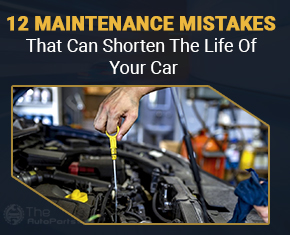Our automobiles serve important roles in our lives, transporting us to and from job, school, the dentist, and the kids’ softball tournaments, but they suffer substantial wear and damage in the process. Cars, like other equipment, require regular maintenance, and when they don’t…
In this write-up, today we will talk about #12 maintenance mistakes that shorten the lifespan of your car.
#1. Not driving the Vehicle
Parking your car idle in your garage & using the bus or bicycle is an amazing way to save fuel, but don’t keep the car parked for too long. If the automobiles are kept idle for months, their tires can get deformed, and batteries can fail. And, the worst part of all, rats & mice can take up home beneath the hood, feeding on the wiring until everything is ruined. Even if you don’t use it frequently, start your automobile once a week & try to drive it at least twice a month.
#2. Wheel rotation failure
Automobile tires today are quite durable. They may often last fifty miles (fifty thousand miles) before needing to be changed. Since the car wheels will wear in a subtly different style according to where they are located on the vehicle, rotating them on a constant schedule will ensure that they wear more uniformly and last longer.
#3. Failure to do recommended oil changes
The motor oil in your automobile is liable for lubricating the engine’s moving parts, but the lubricant can become very thick and unclean with aging. Thus, leading your car engine to overheat & inflicting some early signs of wear & tear on various engine components. Check your car’s owner’s handbook for suggested oil change intervals and stick to them.
#4. Ignoring brake issues
The owner’s handbook will tell you how often your brake pads should be replaced, which is usually every fifty thousand miles. If you stomp on the brakes & hear a whirring sound or sense a thump, though, get them inspected soon, because your car brake pads might be wearing out. If you start ignoring the problem, you risk ruining the brake rotors, which are costly to repair.
#5. Using the wrong parts
If you perform your own auto maintenance, you’ll note that there are hundreds of manufacturers of spark plugs, filters, and various other off-brand components that are touted as being compatible with your car’s make and model. These knockoffs may be less expensive than name-brand components, but they don’t necessarily operate as well and may decrease the life of your vehicle. Always use the parts specified by the manufacturer of your vehicle.
#6. Not having aligned wheels
When a mechanic installs new tires, he aligns the wheels and adjusts them according to the manufacturer’s standards. However, if you hit a pothole or a curb, a wheel may become misaligned. If you notice your automobile tugging to one side or if the steering wheel is crooked when traveling straight, you should get the alignment examined. When you drive a car with out-of-alignment wheels, the tires wear out faster and the automobile is more difficult to maneuver.
#7. Leaving the car wash
Salt, chemicals, and dirt will all dull automotive paint and cause premature corrosion if not cleaned soon. Regular car washes will help maintain the finish of your vehicle, and while you’re there, have the underside washed, as this is where dirt and grime are most prone to accumulate.
#8. Interior destruction
Not only should you maintain the exterior of your automobile clean, but you should also keep the interior clean. Sand, grit, and crumbs can cause serious damage to seats and flooring. To make your car’s interior endure longer, vacuum on a regular basis, remove stains quickly, & wiping away debris, dust, & grime right from the dashboard, car doors, and even from the console.
#9. Checkups are being skipped.
If you wait until an issue becomes visible, your vehicle may have already suffered considerable damage. One of the best methods to safeguard your automobile is to get it serviced professionally once a year. A trained technician will inspect all of the car’s components and inform you if any fixations are required to keep your vehicle operating smoothly.
#10. Neglecting fluid levels
The simplest approach to keep your automobile in good repair between yearly inspections is to check fluid levels periodically and fill them off as needed. This is critical since low fluid levels can cause engine damage. The owner’s handbook for your vehicle has directions for checking the engine oil, brake fluid, coolant, windshield washer fluid, & power steering fluid.
#11. Tire pressure estimation
Tire pressure should be between 30 and 35 pounds per square inch (psi), but don’t simply guess—check! The right pressure for your vehicle can be found in the owner’s handbook or on a label inside the door jamb or on the inside of the gasoline filler door. Incorrect tire pressure can cause steering issues, shorter tire life, or tire failure, all of which increase the danger of an accident.
#12. Ignoring strange noises
Rattles, bangs, and squeals are all symptoms of a problem with your vehicle. If you experience some weird sounds while driving, get your automobile checked out by a professional as soon as possible. Remember that automobiles cannot mend themselves. The longer you wait, the more harm the problem may do and the more costly it may be to repair.
Wrapping It Up
If you have the means to pay a handyman for every household problem, by all means do so. But if you want to save money and be self-sufficient, check out these ingenious gadgets and aftermarket parts that address a million and one tiny problems around the house. For more go now to The Auto Parts Shop!
